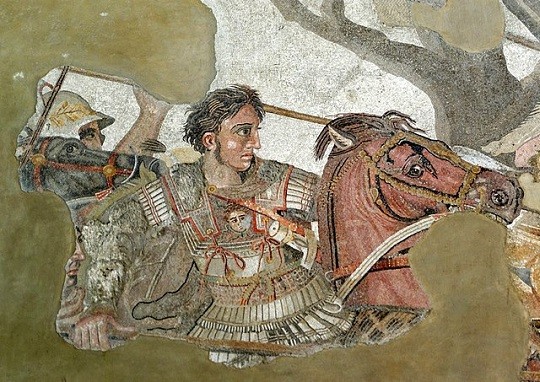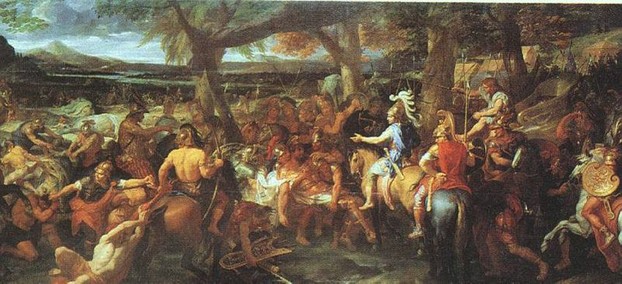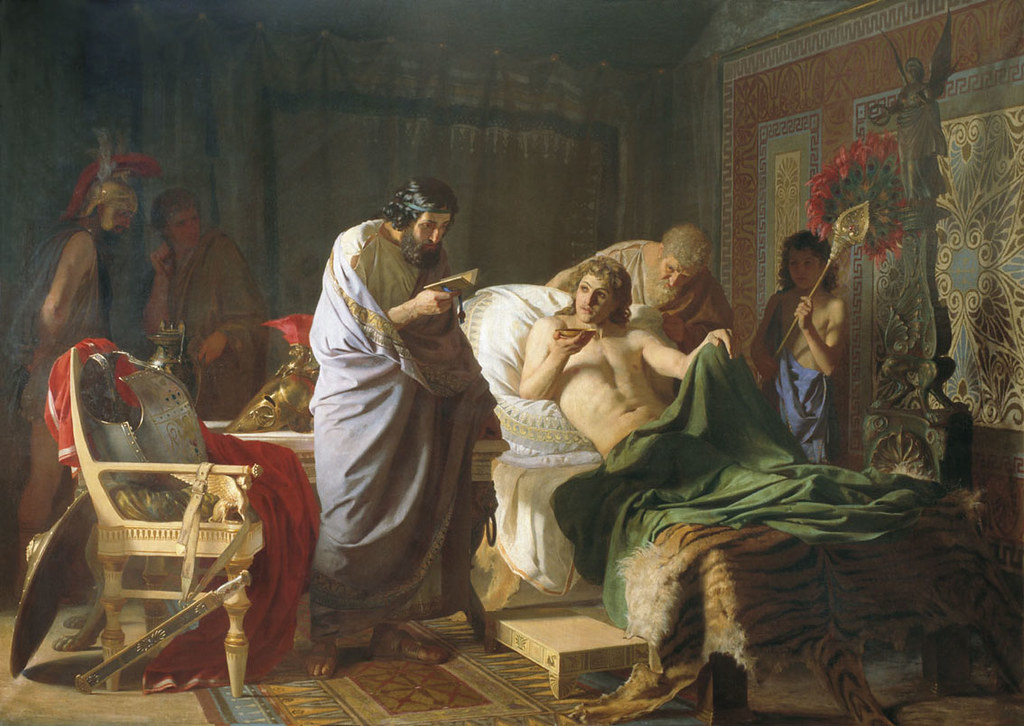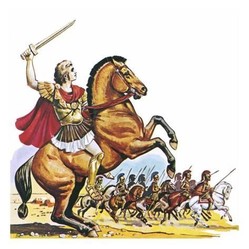The Final Step? - That of being acknowledged and revered as a god-king - was the most important step because his future decisions to continue the expansion of his empire would go (or rather should have gone) unchallenged. His subjects or servants would simply obey the great god-king and yield to his ambitious goals, desires and wishes.
Only ... that did not happen!
*This is what happened.
After crushing Greek rebellions and declaring himself to be master of Greece, he traveled through and conquered most of Asia Minor, on his way to Syria and Egypt. Following those conquests he set out for Mesopotamia and Persia. When all of those areas had been conquered he pushed on and overran the Punjab, determined to conquer all the lands with the aim of dominating India.
As was mentioned earlier, he engaged in a violent battle, at the river Hydaspes in July 326 BC, against the forces of Porus, an Indian leader. But the Indians were defeated.
After this battle, according to one historical account:
"Alexander's next goal was to reach the Ganges River, which was actually 250 miles away, because he thought that it flowed into the outer Ocean. His troops, however, had heard tales of the powerful Indian tribes that lived on the Ganges and remembered the difficulty of the battle with Porus, so they refused to go any farther east. Alexander was extremely disappointed, but he accepted their decision ... During this trip, Alexander sought out the Indian philosophers, the Brahmins, who were famous for their wisdom, and debated them on philosophical issues. He became legendary for centuries in India for being both a wise philosopher and a fearless conqueror." (3)
**So that's what happened.
When Alexander and his army reached the mouth of the Indus River, before he could cross into India, his army got fed up with him and refused to advance any further.
Can you imagine? Rebelling against a god-king? Challenging his authority? REFUSING TO FIGHT FOR HIM?
One would think the penalty or punishment for daring not to submit to the commandments of a god-king would be brutal. Nope! Alexander actually argued with his men for 3 days and then he turned back. He reluctantly turned back. But he did turn back.
Some god-king, eh? Why didn't he zap a few lightning bolts on a few of them and put the other ones in check? The reason why (I think), in his own words: "Sex and sleep alone make me conscious that I am mortal."
- Per bionity.com, "Burnout is a psychological term for the experience of long-term exhaustion and diminished interest." Why did Alexander concede and submit to the (reasonable) demands of his army? Alexander had burnout. That's my non-medical conclusive diagnosis.
His army turned back and Alexander withdrew to Babylon where one night he fell ill. He suffered horribly for about eleven days and then on the 10th of June, 332 BC, he breathed his last breath. Some sources say he died of malaria or a fever, while others state that the cause of his illness was unknown.
I say you can't have a god-king die from a common disease or illness. His death has to be a mystery, unless it's an obvious assassination/murder, like his father.
On his deathbed when asked who would be his successor, it is reported that his response was: "The kingdom shall go to the strongest."
So several years following the death of Alexander the Great, you know who else had to go? That's right. His wife, the beloved Roxana, and his son, young Alexander, were poisoned.
His general fought over his empire until 301 BC, when finally three generals (Honored as guess what? God-kings.) divided it into three kingdoms. Antigonus I took Macedonia and Greece. Ptolemy I ruled over the kingdom of Egypt. Anatolia, Syria and Parthia along with the rest of the Alexander's empire in Asia were ruled by Seleucus I.
The course of history continues, but this HUB stops here because it's about Alexander the Great and not about what happened after he died, especially considering the fact that his bloodline was snuffed out when they killed his only son.
So the remaining commentary will be devoted to the legacy of Alexander the Great, i.e. what civilization inherited upon his untimely demise.

















 Which Blogging Platform Do You Use and Why?on 06/21/2014
Which Blogging Platform Do You Use and Why?on 06/21/2014
 Searching for the Truth?on 05/14/2014
Searching for the Truth?on 05/14/2014
 Review of 3 Bollywood Movies Post September 11thon 05/06/2014
Review of 3 Bollywood Movies Post September 11thon 05/06/2014
 The Eagle Soars Againon 04/10/2014
The Eagle Soars Againon 04/10/2014



Comments
Thanks Ms. Emma! I always enjoy your intellectual stimulation. :)
@EmmaSRose – When you die young with a mystery that shrouds your cause of death and you had already earned the reputation of a great leader, you become the stuff of legends. I think Alexander the Great died because he chose to no longer live; felt he had accomplished all he was going to and decided he wanted to be remembered that way. At that point in his career, he was considered greater than his father in conquests. Why not leave that mark in history? It's a thought.
@KathleenDuffy - Thanks! Thanks!! Thanks!! Appreciate you stopping by. Let's hope there will be no more libraries destroyed.
That's a brilliant article! So much information - and humour too. I've always had a 'crush' on Alexander the Great! Glad to see that the book by Mary Renault is listed there! That's a really good book. Thanks for this! :)
@jptanabe - We all must admit, whether we liked him or despised him, Alexander the Great definitely left his mark in the pages of history. But if you must know the truth, I didn't care too much for his daddy. However a discussion of Philip of Macedon would require another article and I'm just not up to it. :)
Thanks for commenting!
Great article! Alexander certainly had a great influence on the world. His idea of a unified world culture that would be peaceful and prosperous sounds good. He even had some good ideas on how to achieve it - just relying on the sword to create it in the first place was a problem, especially when his men refused to fight any more!
@ologsinquito - I don't take full credit. My husband and son both have an admiration for Alexander the Great. They provided invaluable input.
This is another great article that is so well researched.
Thanks Mr. Robbers.
Great post cmoneyspinner! Well written, presented and quite educative.